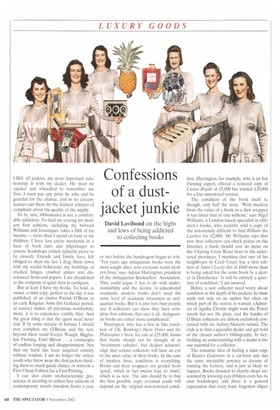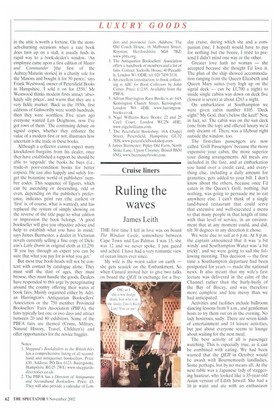Confessions of a dust jacket junkie
David Lovibond on the highs and lows of being addicted to collecting books
LIKE all junkies, my most important relationship is with my dealer. He must be cajoled and wheedled to remember me first, I must pay any price he asks and be grateful for the chance, and in no circumstances can there be the faintest whisper of complaint about the quality of the supply.
To be sure, bibliomania is not a comfortable addiction. To feed my craving for modern first editions, including my beloved Williams and Jenningses, takes a fifth of my income — more than I spend on food or my children. I have lost entire weekends in a haze of book fairs and pilgrimages to remote bookshops (which typically prove to be closed). Friends and family have felt obliged to shun me lest I drag them down with ray sordid behaviour; my burblings of cracked hinges, crushed spines and discoloured front-end papers. I am abandoned to the company of quiet men in cardigans.
But at least I have my books. To hold, as owner, a mint copy, perfect as the day it was published, of an elusive Patrick 0-Brian or an early Kingsley Amis (his Gollancz period, of course) makes all privations worthwhile: more, it is to experience earthly bliss. And the great thing is that the quest need never end. If by some miracle of fortune I should ever complete my O'Brians and the rest, beyond them stand Evelyn Waugh, Biggles, Ian Fleming, Enid Blyton . . a cornucopia of endless longing and disappointment. Not that my habit has been acquired entirely without wisdom. I am no longer the artless youth who threw away the dust-jackets thinking them so much gaudy clutter, or mistook a First Cheap Edition for a First Printing.
I can also claim uncharacteristic prescience in deciding to collect first editions of contemporary novels (modern firsts) a year
or two before the bandwagon began to role. 'Ten years ago antiquarian books were the most sought after, now everyone wants modern firsts,' says Adrian Harrington, president of the Antiquarian Booksellers' Association. 'One could argue it has to do with understandability and the decline in educational standards: modern books don't need the same level of academic awareness as antiquarian books. But it is also how busy people are: if collectors can show they have complete first editions, that says it all. Antiquarian books are rather more complicated.'
Harrington, who has a first in fine condition of J.K. Rowling's Harry Potter and the Philosopher's Stone for sale at £25,000, insists that books should not be thought of as 'investment vehicles', but dealers acknowledge that serious collectors will have an eye to the asset value of their books. In the case of modern firsts, condition is everything. Books and their wrappers are graded from 'good', which in fact means bad, to 'mint', which is as new. The aim should be to buy the best possible copy; eventual resale will depend on the original non-restored condi
tion. Harrington, for example, who is an Ian Fleming expert, offered a restored copy of Casino Royale at £5,000 but wanted £20,000 for a fine unrestored version.
The condition of the book itself is, though, only half the story. 'With modern firsts the value of a book in a dust wrapper is ten times that of one without,' says Nigel Williams, a London-based specialist in children's books, who recently sold a copy of the notoriously difficult to find William the Lawless for £2,000. Mr Williams says that now that collectors can check prices on the Internet, a book should cost no more on the Charing Cross Road than in the unlettered provinces. I mention that one of his neighbours in Cecil Court has a first edition of Amis's Lucky Jim at £600 more than is being asked for the same book by a dealer in Dorchester. 'It will be entirely a question of condition,' I am assured.
Before a new collector need worry about condition or the depth of his pockets, he must settle not only on an author but often on which part of the oeuvre is wanted. (Admirers of Agatha Christie might want the Poirot novels but not the plays, and the hordes of O'Brian collectors are almost exclusively concerned with his Aubrey/Maturin series). The trick is to find a specialist dealer and get hold of the chosen author's bibliography. In fact, building an understanding with a dealer is the one essential for a collector.
The romantic idea of finding a mint copy of Keats's Endvmion in a car-boot sale has the same irresistible potency as dreams of winning the Lottery, and is just as likely to happen. Books donated to charity shops are scanned by knowing eyes (Oxfam even has its own bookshops), and there is a general expectation that every least, forgotten object
in the attic is worth a fortune. On the stomach-churning occasions when a rare book does turn up on a stall, it usually finds its rapid way to a book-dealer's window. An employee came upon a first edition of Master and Commander ithe first of the Aubrey/Maturin stories] in a charity sale for the Masons and bought it for 50 pence,' says Frank Westwood, owner of Petersfield Books in Hampshire. 'I sold it on for f..550.' Mr Westwood thinks modern firsts attract 'absolutely silly prices', and warns that they are a very fickle market: 'Back in the 1930s, first editions of Galsworthy were worth hundreds, then they were worthless. Five years ago everyone wanted Len Deightons, now I've got rows of them.' The continuing debate on signed copies, whether they enhance the value of a modern first or not, illustrates how uncertain is the trade in these books.
Although a collector cannot expect many knockdown bargains from his dealer, once they have established a rapport he should be able to 'upgrade the books he buys (i.e., trade-in poor-condition books for better copies). He can also happily and safely forget the byzantine world of publishers' number codes. This sequence of figures. which can be ascending or descending, odd or even, depending on the publisher's preference, indicates print run (the earliest or 'first' is, of course, what is wanted), and has replaced the system of simply showing on the reverse of the title page to what edition or impression the book belongs. 'A good bookseller will give you objective advice and help to establish what you have in mind,' says James Burmester, a dealer in Victorian novels currently selling a fine copy of Dickens's Little Dorrit in original cloth at 13,250. 'If you buy through an expert you can be sure that what you pay for is what you get.'
But most true book-heads will not be content with contact by catalogue alone. They must sniff the dust of ages, they must browse, they must handle the goods. Dealers have responded to this urge by peregrinating around the country offering their wares at book fairs. Mainly organised either by Adrian Harrington's Antiquarian Booksellers' Association or the 750 member Provincial Booksellers' Fairs Association (PBFA), the fairs typically last one or two days and attract between 20 and 80 exhibitors. Some of the PBFA fairs are themed (Crime, Military, Natural History, Travel, Children's) and offer opportunities for the novice haggler.
Notes:
1. Sheppard's Bookdealers in the British Isles has a comprehensive listing of all secondhand and antiquarian booksellers. Price: £30. Address: PO Box 6123, Basingstoke. Hampshire R625 2WE: www.sheppardsdirectorics.co.uk.
2. The PBFA has a Directory of Antiquarian and Secondhand Booksellers, Price: £3. They will also provide a calendar of Lon don and provincial fairs. Address: The Old Coach House, 16 Melbourn Street, Royston, Hertfordshire SG8 7BZ: www.pbfa.org.
3. The Antiquarian Booksellers' Association offers a handbook of members and a list of fairs. Contact: Sackville House, 40 Piccadilly, London WI ODR; tel: 020 7439 3118.
4. An excellent introduction to book collecting is ABC for Book Collectors by John Carter. Price: 112.95. Available from the PBFA.
5. Adrian Harrington Rare Books is at: 64A Kensington Church Street, Kensington, London W8 4DB: www.harringtonhooks.co.uk.
6. Nigel Williams Rare Books: 22 and 25 Cecil Court. London WC2N 4HE; www.nigelwilliams.com.
7. The Petersfield Bookshop: 16A Chapel Street, Petersfield, Hampshire GU32 3DS; www.petersfieldbookshop.com.
8. James Burmester: Pipley Old Farm, North Stoke Lane, Upton Cheyney, Bristol BS30 6NG; www.bunnesterbooks.com.



















































































































 Previous page
Previous page